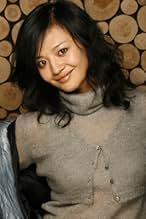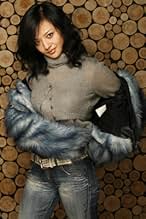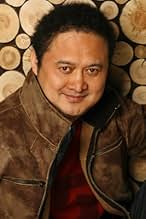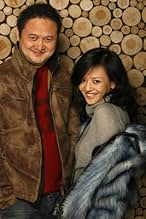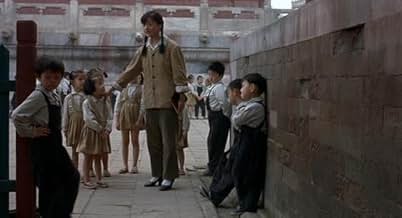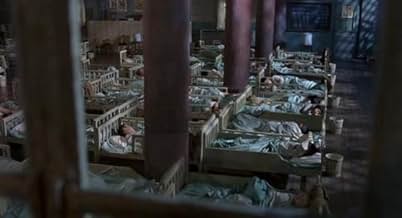Kan shang qu hen mei
- 2006
- 1h 32min
PUNTUACIÓN EN IMDb
6,7/10
1,6 mil
TU PUNTUACIÓN
Añade un argumento en tu idiomaA young boy starting school for the first time struggles to fit in to a strictly regimented society in in post-revolutionary China.A young boy starting school for the first time struggles to fit in to a strictly regimented society in in post-revolutionary China.A young boy starting school for the first time struggles to fit in to a strictly regimented society in in post-revolutionary China.
- Premios
- 8 premios y 3 nominaciones en total
Argumento
Reseña destacada
Little Red Flowers is rather-a bright and breezy film on the surface, a film coated with a light and somewhat fluffy exterior about a young boy's mishaps at school and rather quaint friendship he strikes up with another girl that overall masks what rather disturbing substance lies beneath; a film featuring young children looking cute and doing all manner of rather childish things which we may find quite sweet but much more importantly exploring ideas of power, control and the reactions those go through when exposed to these items. Chinese director Yuan Zhang distills, through very young children occupying a live-in nursery, a human-being's reaction to imperialistic and strict attitudes towards life and functioning which lead's to many seemingly happily abiding but one overtly reacting to the taking away of their freedom and their choice as to whether or not to live under the inferred state's imposed sanctions. The film is on one level a whimsical enough comedy about a child fumbling and bumbling their way through a locale with others his age whom get in on the act far quicker than he does, deeper still it is a quite frightening plight of one person's struggle against overwhelming odds which will eventually lead to attempted revolution and proposed violence when the way of living isn't inclined enough towards one's own choice.
The film begins with the lead, a four year old Fang Qiangqiang played by child actor Bowen Dong, in the process of being delivered to a boarding nursery school for both genders by his father in late-1940's China. The father is kept anonymous, cut off from around the knees upwards leaving the audience solely to be able to focus on that of both the disillusioned Fang and the headteacher Miss Li (Rui). Fang is very much an outcast to this play school nursery zone, the other children have already long since been moulded into a unit of kids whom go along with the teachers' wishes and do what they're told. The film enjoys its mise-en-scene of a somewhat militarian nature at the school, the trooping around of the playground by the teachers echoing the activity to that of guards at a kind of establishment as well as the sleeping quarters of the children shrouded together as if in an army barracks, It is a place Fang is delivered to in the middle of winter, the climbing-frames and roundabouts lying dormant and forlorn outside as they sit there drenched in heavy snow. Inside, regimental set ups dominate the way of operation with rewards distributed by the establishment in the form of the titular little red flowers as children go through with the basic life-skills more inclined towards the hygiene required in life.
Fang is initially unable to compete; he's left there to cry an awful lot, appears in different clothing to that of the others and dislikes both the regime and system. At first it's inclined it may be down to home-sickness, but as things transpire the consequent reactions to the school's set up infer that it is fear and sadness born out of how things are run. There is a wide shot during his tenure as the cygnet amidst the swans which encompasses the sheer menagerie of other youngsters within the locale encapsulating his alienation, as he is greeted into the imminent scenario by a sternly face teacher and then forced into changing into his day clothes, despite knowledge all round that he is unable to do so, in front of everybody. There is a temptation to read Little Red Flowers on an initial level linked more broadly to that of it being a straight forward depiction of a school for children doing what they're told since, how else are they supposed to live? On another level, the film's clear distinction between ruler and ruled twinned with the fact it has been produced by a nation no-less than China along with the fact director Zhang strikes me, from reading of his past-work, to be a too accomplished-a filmmaker to produce a straight up film depicting such a scenario without allegory.
One of the starker moments in his film actually occurs outside of the boarding kindergarten, a short walk around local sites or what-not resulting in the children venturing past a small squad of Chinese soldiers out and about going through drills for whatever purpose; the placing of them in the background as our children occupy the foreground effectively competing in the same action foreshadowing generational jumps from regimental circumstances unto further ways of living of similar distinction. While there is nothing particularly sordid or necessarily evil about the school, exemplified in a song it has everybody sing about the sharing of an apple and upholding positive characteristics, it is a rather engaging look into how a working system of such an assimilated nature can affect those of which are processed through it; more broadly, how imagery and particular methods in bringing somebody up or bringing somebody around to be of a particular 'type' can have ill affects on those undergoing said process, the majority of it culminating in a really smartly played drama tackling some interesting themes.
The film begins with the lead, a four year old Fang Qiangqiang played by child actor Bowen Dong, in the process of being delivered to a boarding nursery school for both genders by his father in late-1940's China. The father is kept anonymous, cut off from around the knees upwards leaving the audience solely to be able to focus on that of both the disillusioned Fang and the headteacher Miss Li (Rui). Fang is very much an outcast to this play school nursery zone, the other children have already long since been moulded into a unit of kids whom go along with the teachers' wishes and do what they're told. The film enjoys its mise-en-scene of a somewhat militarian nature at the school, the trooping around of the playground by the teachers echoing the activity to that of guards at a kind of establishment as well as the sleeping quarters of the children shrouded together as if in an army barracks, It is a place Fang is delivered to in the middle of winter, the climbing-frames and roundabouts lying dormant and forlorn outside as they sit there drenched in heavy snow. Inside, regimental set ups dominate the way of operation with rewards distributed by the establishment in the form of the titular little red flowers as children go through with the basic life-skills more inclined towards the hygiene required in life.
Fang is initially unable to compete; he's left there to cry an awful lot, appears in different clothing to that of the others and dislikes both the regime and system. At first it's inclined it may be down to home-sickness, but as things transpire the consequent reactions to the school's set up infer that it is fear and sadness born out of how things are run. There is a wide shot during his tenure as the cygnet amidst the swans which encompasses the sheer menagerie of other youngsters within the locale encapsulating his alienation, as he is greeted into the imminent scenario by a sternly face teacher and then forced into changing into his day clothes, despite knowledge all round that he is unable to do so, in front of everybody. There is a temptation to read Little Red Flowers on an initial level linked more broadly to that of it being a straight forward depiction of a school for children doing what they're told since, how else are they supposed to live? On another level, the film's clear distinction between ruler and ruled twinned with the fact it has been produced by a nation no-less than China along with the fact director Zhang strikes me, from reading of his past-work, to be a too accomplished-a filmmaker to produce a straight up film depicting such a scenario without allegory.
One of the starker moments in his film actually occurs outside of the boarding kindergarten, a short walk around local sites or what-not resulting in the children venturing past a small squad of Chinese soldiers out and about going through drills for whatever purpose; the placing of them in the background as our children occupy the foreground effectively competing in the same action foreshadowing generational jumps from regimental circumstances unto further ways of living of similar distinction. While there is nothing particularly sordid or necessarily evil about the school, exemplified in a song it has everybody sing about the sharing of an apple and upholding positive characteristics, it is a rather engaging look into how a working system of such an assimilated nature can affect those of which are processed through it; more broadly, how imagery and particular methods in bringing somebody up or bringing somebody around to be of a particular 'type' can have ill affects on those undergoing said process, the majority of it culminating in a really smartly played drama tackling some interesting themes.
- johnnyboyz
- 5 mar 2011
- Enlace permanente
Selecciones populares
Inicia sesión para calificar y añadir a tu lista para recibir recomendaciones personalizadas
- How long is Little Red Flowers?Con tecnología de Alexa
Detalles
Taquilla
- Recaudación en todo el mundo
- 303.898 US$
- Duración1 hora 32 minutos
- Color
- Mezcla de sonido
Contribuir a esta página
Sugerir un cambio o añadir el contenido que falta

Principal laguna de datos
By what name was Kan shang qu hen mei (2006) officially released in India in English?
Responde

